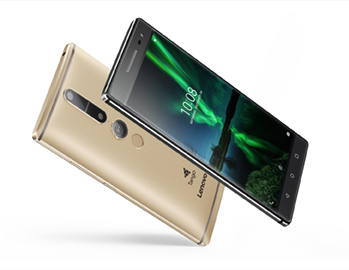
Lenovo Phab 2 Pro
 Lenovo has released their first consumer Tango phone with some pretty impressive specs and functionality. Priced at $499, unfortunately there is no UK pricing yet, the Phab 2 Pro is a bit of a monster coming in with a 6.4 inch, but stunning, screen. It will be at the edge of most people’s comfort zone when trying to hold it in one hand but the sheer size has allowed Lenovo to pack in some pretty cool tech.
Lenovo has released their first consumer Tango phone with some pretty impressive specs and functionality. Priced at $499, unfortunately there is no UK pricing yet, the Phab 2 Pro is a bit of a monster coming in with a 6.4 inch, but stunning, screen. It will be at the edge of most people’s comfort zone when trying to hold it in one hand but the sheer size has allowed Lenovo to pack in some pretty cool tech.
The Phab 2 Pro is hanging its hat on the augmented reality (AR) market and is able to render AR in real time with the use of some rear cameras and some beefy power in the device itself, Snapdragon 652 processor. So what does AR do exactly? Using motion tracking , depth perception and area learning the device can integrate your surroundings into whichever Tango application you are using. For example, you may see a nice sofa for sale and are unsure if it will fit into your living room. You would be able to layer the sofa into your living room to not just determine its size but also how it fits in with the rest of your furniture.
Although a relatively simple example, there are many business cases for AR coming to the fore right now. The Phab 2 Pro is definitely unique but the real success will be almost entirely dependent on the applications built by the developer community. In the consumer world AR functionality is being used in a number of ways from museum tours to general inside navigation. In the engineering world AR is increasingly being used to guide less experienced engineers and it is also a common technology used for industries that use drones. More industries are also finding use cases all the time.
The phone itself is well designed and finished, it is also packing 4GB RAM, 64GB of onboard storage that can be boosted up to 128GB with the microSD slot, Dolby Atmos speakers, Dolby 5.1 audio capture, and a jumbo 4,050mAh battery.
The success of this phone will come down to the apps created for it. If the Tango ecosystem takes off this could present several niche opportunities for the Channel to be able to take advantage of the AR world and present several unique AR opportunities to their customers. This will be an interesting device to watch, however it won’t be available in the UK until September.
Vodafone Smart Platinum 7
![Vodafone-Smart-Platinum-7[1]](/media/v33hfvxm/vodafone-smart-platinum-71.jpg) Phones released by the networks have been pretty average on the whole so when we heard Vodafone had pushed the boat out with the Platinum 7 I had to take a look.
Phones released by the networks have been pretty average on the whole so when we heard Vodafone had pushed the boat out with the Platinum 7 I had to take a look.
It has a 5.5-inch 2K display which did puzzle me at first until I realised it was meant to be used with the new Vodafone VR (Virtual Reality) headset. If you were wondering how to get hold on the VR headset then you need not worry, Vodafone have thrown it in for free! The device comes with a £300 price tag that’s pretty impressive.
The £300 will also get you the stock Android Marshmallow OS, 32GB of internal storage as well as microSD support of up to 128GB. The whole thing is powered with 3GB of RAM and a Qualcomm Snapdragon 652 octa-core processor.
Design-wise the device looks pretty sharp, another surprise from a network phone, and is made from aircraft grade aluminium and features a rear fingerprint sensor
Vodafone claims the 3000mAh non-removable battery will squeeze two days of life out of this phone from one charge. Given the 2K screen I would say this is unlikely, in fact given that all manufacturers are pretty far from the mark when it comes to battery I would say this is unlikely. However, it does have a quick battery charge function called Quick Charge 3.0 which is designed specifically for rapid battery top-ups.
On the surface this phone is actually pretty compelling, especially for those wanting to dabble with VR but also keep costs down. Interestingly, by keeping the phone cheap Vodafone are probably hoping to give the VR market a boost. The Channel probably won’t need to worry about the VR market for a few years yet as applications for businesses are barely defined. However, as always there will be much in this space which we haven’t considered yet so it is a market worth keeping an eye on.
